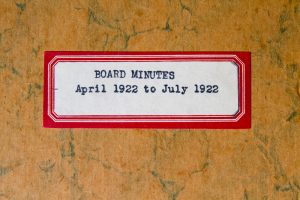Now & Then: Boards Tackle Recurring Issues Through the Years
Tomorrow is Election Day for School Boards in Iowa
Over the summer the official minutes of more than a century’s worth of school board meetings were consolidated in one central location. With another school board election upon us, a skimming of the record quickly suggests both how much and how little things have changed. In more than a century we’ve come full circle, all the way back to many of the fundamental issues that are always at the crux of public education.
Think all the talk of technology in schools is a uniquely 21st century development?
In 1905 the Mutual Telephone Company proposed to install desk telephones in the office of the superintendent and the board secretary, and provide service to them through its general exchange switchboard for the sum of $39 per year. Furthermore, the proposal continued, a telephone would be installed and serviced through party lines at as many of the district schools as the board designated, each at$18 per year and equipped so as to enable the superintendent to “grant or refuse permission to the public to communicate with the schools.”
Upkeep of schools was a concern long before the district’s current work to renovate and update facilities to state-of-the-art conditions.
“Among the more importent (sic) repairs we recommend…there should be sidewalks from the building to the water closets at the rear of the grounds,” (at Park Avenue), read a report from the Building Committee in the summer of 1904 that also went on to call for some “sand for the playground” at Kirkwood, among many other things, including some new blackboards.
Imagine if you had to pay someone to fill in when you were sick and unable to work. That’s how it was for contracted teachers who had to pay substitutes when they were absent.
In September 1905 the Board adopted the following recommendations of Superintendent W.O Riddell: “Teachers receiving less than $50.00 a month shall pay their substitutes at the rate of $2.00 per day, unless this amount should be greater than the teacher’s own salary, in which case the teacher shall pay only the amount of her (emphasis added) salary, and the district the balance necessary to bring the amount up to $2 a day.”
School leadership has long been recognized as a key factor by the community.
In March of 1905 the principal of North High submitted a desperate letter of resignation that read, in part, “On account of the evident prejudices entertained by some of the North Des Moines citizens against a woman as principal of their High School (sic),” pleaded Amelia Morton, “I beg of you not to ask me to work there next year.”
But in April the Board received a petition imploring that Miss Morton’s resignation not stand.
“Everybody is satisfied except some five men…” it read. “…the School Board might take a stand in this matter and down this monster of malice and fussiness…the government of the school has been fine and there has been none of the usual trouble with the big boys…”
The appointment of North’s principal was deferred to the next meeting but there is no further reference to the matter. Apparently Miss Morton was not persuaded to reconsider.
Not even schools are immune from debates about war and peace. During the “war to end all wars,” students were encouraged to change their diet to aid the cause in Europe.
As World War I raged, that national preoccupation was naturally reflected in the schools. In a log of correspondence from Supt. Z.C. Thornburg to Des Moines principals for 1917, much is made of the importance of children’s diets. But it wasn’t childhood obesity that concerned him, as is the case today. It was the national effort to conserve foodstuffs, particularly wheat, “to change the eating habits of the 100 million people in our country so that the needed supplies of food may be furnished to our allies.” In preaching the “gospel of the clean plate,” Thornburg went on to explain that “the vicious submarine has sunk boat after boat filled with…fertilizers which England, France and Italy have always imported…to preserve the fertility of their soil. For three years the world has been engaged in this ghastly effort to destroy and the soil is now beginning to take its revenge.”
Lack of fat was a potential crisis. In Europe at the time “Grease from the kitchen sink is carefully treasured, and soap, the basis of which is fat, is becoming a luxury of millionaires…and unless the housekeepers of America realize the extreme importance of not wasting…any unnecessary bit of butter or other animal fat, we may later be in the same situation.”
Women weren’t guaranteed the right to vote until the 19th amendment was adopted in 1920. Prior to then the suffrage movement made incremental progress in state and local elections.
A partial listing of returns from the Des Moines school board election of 1910 pasted on the inside cover of one of the minutes journals records that a total of 8,633 men cast ballots compared to only 1,215 women. According to the Polk County Election Office, in the most recent Des Moines school board election in 2011, women out-voted men, 3,071 to 2,739. Or, put another way, fewer people voted but a majority of them were women.
As the saying goes, “the more things change, the more they stay the same.” From the upkeep of school buildings to the technology inside them to the compensation of our teachers, School Boards – whether today or a century ago – play a critical role in the quality of the public education offered in the community.
The polls in Des Moines are open tomorrow from 7:00 A.M. to 8:00 P.M.
This is the first installment in what will be an occasional series of looks back into the DMPS archives for some perspective on where we’ve come from, where we are today and where we’re headed in the future.







